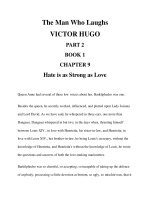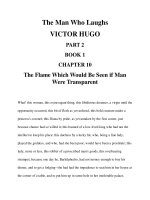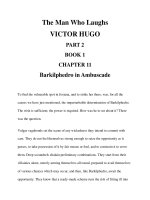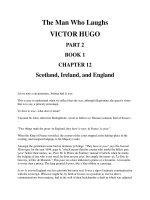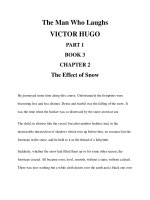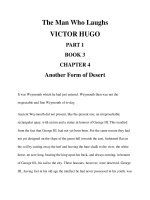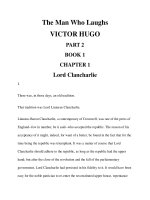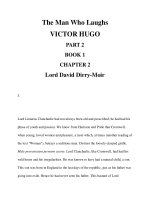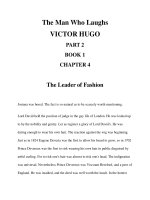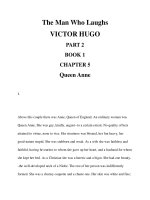THE MAN WHO LAUGHS VICTOR HUGO PART 2 BOOK 3 CHAPTER 4 pot
Bạn đang xem bản rút gọn của tài liệu. Xem và tải ngay bản đầy đủ của tài liệu tại đây (22.27 KB, 8 trang )
THE MAN WHO LAUGHS
VICTOR HUGO
PART 2
BOOK 3
CHAPTER 4
Contraries Fraternize in Hate
Success is hateful, especially to those whom it overthrows. It is rare that the eaten
adore the eaters.
The Laughing Man had decidedly made a hit. The mountebanks around were
indignant. A theatrical success is a syphon it pumps in the crowd and creates
emptiness all round. The shop opposite is done for. The increased receipts of the
Green Box caused a corresponding decrease in the receipts of the surrounding
shows. Those entertainments, popular up to that time, suddenly collapsed. It was
like a low-water mark, showing inversely, but in perfect concordance, the rise here,
the fall there. Theatres experience the effect of tides: they rise in one only on
condition of falling in another. The swarming foreigners who exhibited their
talents and their trumpetings on the neighbouring platforms, seeing themselves
ruined by the Laughing Man, were despairing, yet dazzled. All the grimacers, all
the clowns, all the merry-andrews envied Gwynplaine. How happy he must be with
the snout of a wild beast! The buffoon mothers and dancers on the tight-rope, with
pretty children, looked at them in anger, and pointing out Gwynplaine, would say,
"What a pity you have not a face like that!" Some beat their babes savagely for
being pretty. More than one, had she known the secret, would have fashioned her
son's face in the Gwynplaine style. The head of an angel, which brings no money
in, is not as good as that of a lucrative devil. One day the mother of a little child
who was a marvel of beauty, and who acted a cupid, exclaimed,
"Our children are failures! They only succeeded with Gwynplaine." And shaking
her fist at her son, she added, "If I only knew your father, wouldn't he catch it!"
Gwynplaine was the goose with the golden eggs! What a marvellous phenomenon!
There was an uproar through all the caravans. The mountebanks, enthusiastic and
exasperated, looked at Gwynplaine and gnashed their teeth. Admiring anger is
called envy. Then it howls! They tried to disturb "Chaos Vanquished;" made a
cabal, hissed, scolded, shouted! This was an excuse for Ursus to make out-of-door
harangues to the populace, and for his friend Tom-Jim-Jack to use his fists to re-
establish order. His pugilistic marks of friendship brought him still more under the
notice and regard of Ursus and Gwynplaine. At a distance, however, for the group
in the Green Box sufficed to themselves, and held aloof from the rest of the world,
and because Tom-Jim-Jack, this leader of the mob, seemed a sort of supreme bully,
without a tie, without a friend; a smasher of windows, a manager of men, now
here, now gone, hail-fellow-well-met with every one, companion of none.
This raging envy against Gwynplaine did not give in for a few friendly hits from
Tom-Jim-Jack. The outcries having miscarried, the mountebanks of Tarrinzeau
Field fell back on a petition. They addressed to the authorities. This is the usual
course. Against an unpleasant success we first try to stir up the crowd and then we
petition the magistrate.
With the merry-andrews the reverends allied themselves. The Laughing Man had
inflicted a blow on the preachers. There were empty places not only in the
caravans, but in the churches. The congregations in the churches of the five
parishes in Southwark had dwindled away. People left before the sermon to go to
Gwynplaine. "Chaos Vanquished," the Green Box, the Laughing Man, all the
abominations of Baal, eclipsed the eloquence of the pulpit. The voice crying in the
desert, vox clamantis in deserto, is discontented, and is prone to call for the aid of
the authorities. The clergy of the five parishes complained to the Bishop of
London, who complained to her Majesty.
The complaint of the merry-andrews was based on religion. They declared it to be
insulted. They described Gwynplaine as a sorcerer, and Ursus as an atheist. The
reverend gentlemen invoked social order. Setting orthodoxy aside they took action
on the fact that Acts of Parliament were violated. It was clever. Because it was the
period of Mr. Locke, who had died but six months previously 28th October, 1704-
-and when scepticism, which Bolingbroke had imbibed from Voltaire, was taking
root. Later on Wesley came and restored the Bible, as Loyola restored the papacy.
Thus the Green Box was battered on both sides; by the merry-andrews, in the name
of the Pentateuch, and by chaplains in the name of the police. In the name of
Heaven and of the inspectors of nuisances. The Green Box was denounced by the
priests as an obstruction, and by the jugglers as sacrilegious.
Had they any pretext? Was there any excuse? Yes. What was the crime? This:
there was the wolf. A dog was allowable; a wolf forbidden. In England the wolf is
an outlaw. England admits the dog which barks, but not the dog which howls a
shade of difference between the yard and the woods.
The rectors and vicars of the five parishes of Southwark called attention in their
petitions to numerous parliamentary and royal statutes putting the wolf beyond the
protection of the law. They moved for something like the imprisonment of
Gwynplaine and the execution of the wolf, or at any rate for their banishment. The
question was one of public importance, the danger to persons passing, etc. And on
this point, they appealed to the Faculty. They cited the opinion of the Eighty
physicians of London, a learned body which dates from Henry VIII., which has a
seal like that of the State, which can raise sick people to the dignity of being
amenable to their jurisdiction, which has the right to imprison those who infringe
its law and contravene its ordinances, and which, amongst other useful regulations
for the health of the citizens, put beyond doubt this fact acquired by science; that if
a wolf sees a man first, the man becomes hoarse for life. Besides, he may be bitten.
Homo, then, was a pretext.
Ursus heard of these designs through the inn-keeper. He was uneasy. He was afraid
of two claws the police and the justices. To be afraid of the magistracy, it is
sufficient to be afraid, there is no need to be guilty. Ursus had no desire for contact
with sheriffs, provosts, bailiffs, and coroners. His eagerness to make their
acquaintance amounted to nil. His curiosity to see the magistrates was about as
great as the hare's to see the greyhound.
He began to regret that he had come to London. "'Better' is the enemy of 'good,'"
murmured he apart. "I thought the proverb was ill-considered. I was wrong. Stupid
truths are true truths."
Against the coalition of powers merry-andrews taking in hand the cause of
religion, and chaplains, indignant in the name of medicine the poor Green Box,
suspected of sorcery in Gwynplaine and of hydrophobia in Homo, had only one
thing in its favour (but a thing of great power in England), municipal inactivity. It
is to the local authorities letting things take their own course that Englishmen owe
their liberty. Liberty in England behaves very much as the sea around England. It
is a tide. Little by little manners surmount the law. A cruel system of legislation
drowned under the wave of custom; a savage code of laws still visible through the
transparency of universal liberty: such is England.
The Laughing Man, "Chaos Vanquished," and Homo might have mountebanks,
preachers, bishops, the House of Commons, the House of Lords, her Majesty,
London, and the whole of England against them, and remain undisturbed so long as
Southwark permitted.
The Green Box was the favourite amusement of the suburb, and the local
authorities seemed disinclined to interfere. In England, indifference is protection.
So long as the sheriff of the county of Surrey, to the jurisdiction of which
Southwark belongs, did not move in the matter, Ursus breathed freely, and Homo
could sleep on his wolf's ears.
So long as the hatred which it excited did not occasion acts of violence, it
increased success. The Green Box was none the worse for it, for the time. On the
contrary, hints were scattered that it contained something mysterious. Hence the
Laughing Man became more and more popular. The public follow with gusto the
scent of anything contraband. To be suspected is a recommendation. The people
adopt by instinct that at which the finger is pointed. The thing which is denounced
is like the savour of forbidden fruit; we rush to eat it. Besides, applause which
irritates some one, especially if that some one is in authority, is sweet. To perform,
whilst passing a pleasant evening, both an act of kindness to the oppressed and of
opposition to the oppressor is agreeable. You are protecting at the same time that
you are being amused. So the theatrical caravans on the bowling-green continued
to howl and to cabal against the Laughing Man. Nothing could be better calculated
to enhance his success. The shouts of one's enemies are useful and give point and
vitality to one's triumph. A friend wearies sooner in praise than an enemy in abuse.
To abuse does not hurt. Enemies are ignorant of this fact. They cannot help
insulting us, and this constitutes their use. They cannot hold their tongues, and thus
keep the public awake.
The crowds which flocked to "Chaos Vanquished" increased daily.
Ursus kept what Master Nicless had said of intriguers and complaints in high
places to himself, and did not tell Gwynplaine, lest it should trouble the ease of his
acting by creating anxiety. If evil was to come, he would be sure to know it soon
enough.
